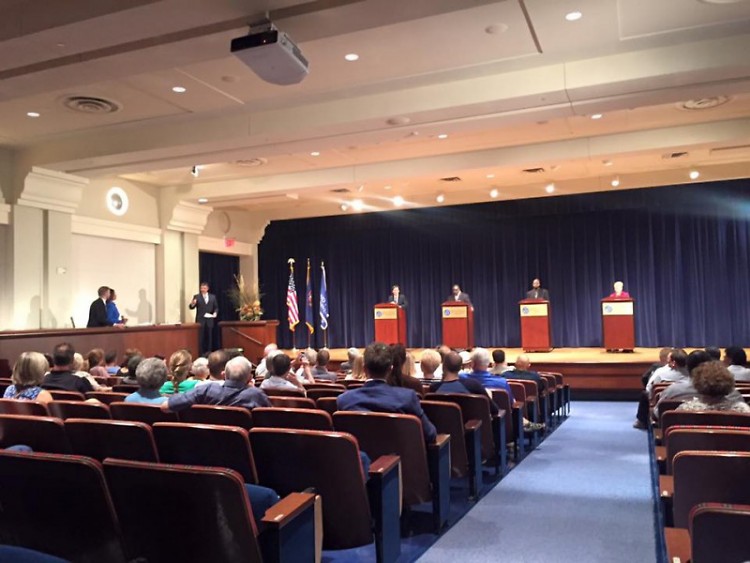Last Thursday, all four mayoral candidates faced off in a final debate before Grand Rapids’ primary election, focusing on the topic of income inequality.
The July 30 debate took place at Loosemore Auditorium at Grand Valley State University’s downtown campus. Income inequality as well as city budget and financial situations, taxes and topics relating to race were discussed.
City Commissioner Rosalynn Bliss used her opening statement as a chance to argue Rev. Robert Dean’s claims that the city is facing a financial crisis and that we are nearing the edge of a “fiscal cliff.”
Dean’s campaign has mailed out fliers stating that the city is nearing a crisis of being over $1 billion in debt. Bliss directly rejected these claims.
“There are people filling your mailbox saying our city is facing a fiscal crisis. That is not true,” Bliss says. “To misrepresent the direction of this community is insulting.”
Dean and Bliss went head to head numerous times throughout the debate, rebutting each other’s statements.
Dean denounced Bliss for the spending of $2.5 million on the Indian Trails Golf Course, saying that the city should prioritize and focus on funding that will benefit a greater amount of people rather than just “the elite.”
Bliss was quick to state that several years ago when the commission looked into selling the property, the residents of the third ward objected.
"You know what we heard? The golf course is an asset with a rich history in our city," Bliss says. "We need to make sure it's sustainable in the long run. That money is a good investment."
Though there was controversy about the extent of the city’s debt, the candidates voiced their opinions on what they would do to control that debt. On the topic of budget priorities, John George says he would “analyze costs and see if we’re benefiting from those costs,” and mentioned looking into tax cuts.
Willard Lee says he would get rid of current debt as well as look into tax cuts. Lee also spoke about the idea of legalizing marijuana in order to increase tax revenue as well as create jobs. Bliss says a budget stabilization fund is a necessity.
“We need to have a rainy day fund so if we have to weather another economic storm, we’re prepared,” Bliss says. “We weren’t last time.”
Dean also says his first priority would be to get debt under control.
The candidates agreed that there is an importance in having a healthy local economy. On the topic of how to increase the number of minority owned businesses, George says to simply make it easier to open a business and have less regulations. He also points out that he is in support of a free market.
Dean mentions classism, saying,“It’s not about color, it’s about the economics.”
Bliss suggests a microloan program with discounts for minorities and women.
During a Q&A session following the debate, a question was asked about the root of race relations and tension. George answered that he felt the issue stemmed from a federal level and that the coverage of the issue seemed excessive.
“I believe the Federal Government are creating problems, exasperating issues and encouraging ill will with races,” George says.
He referenced the case of Trayvon Martin, a Black 17-year-old who was fatally shot by George Zimmerman in 2012.
“The president said, ‘If I had a son, he’d be like Trayvon Martin,’” George says. “I would hope the president would raise his son better than that.”
Tension filled the auditorium and many audience members reacted to George’s statement with a gasp.
“The heart of it is systematic and institutional racism,” says Bliss, saying it is important for people to listen, do what they can to help the issue, practice self awareness and work with others to create change.
Polling will be from 7 a.m. to 8 p.m. this Tuesday, Aug. 4. In order to avoid runoff, a candidate will need to receive over 50 percent of the vote. If none of the candidates receive 51 percent of the vote, the race will go into runoff and the race will proceed into the November election.
The Rapidian, a program of the 501(c)3 nonprofit Community Media Center, relies on the community’s support to help cover the cost of training reporters and publishing content.
We need your help.
If each of our readers and content creators who values this community platform help support its creation and maintenance, The Rapidian can continue to educate and facilitate a conversation around issues for years to come.
Please support The Rapidian and make a contribution today.
